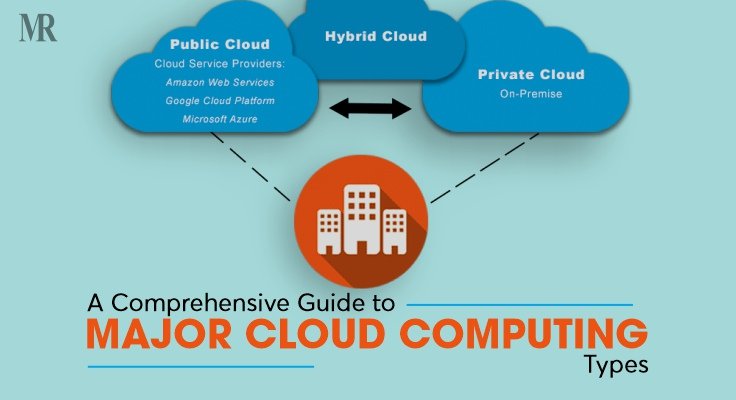“We need to substitute for the book a device that will make it easy to transmit information without transporting material.” – J. C. R. Licklider
J.C.R.Licklider believed that those computers could be used for more than just large calculators, but instead they could perform scientific thinking. He thought that man and computer are not apart, but they are interrelated to each other not only for solving big data, but also for the networking with other humans.
His vision was for everyone on the globe to be interconnected and accessing programs and data at any site, from anywhere, “It is a vision that sounds a lot like what we are calling cloud computing.”
What is Cloud Computing?
Before learning about cloud computing types, it is important to understand the concept of cloud.
When we use someone’s service over the internet instead of buying a software is called cloud computing.
Lets understand through example, Mari is having a small shop where she sells clothes, so she needs an accountant, manager, etc. to handle that shop.But she can’t afford that due to small business, but instead of that she can use various software like Google drive, Google sheets, Google calendar, drop box etc.
Cloud computing allows companies to access the hosted software over the internet
Usage of cloud computing
- Create new apps and services – This helps the company to create apps so that they can host their app.For example,Sketchware helps to create apps and host it also.
- Store, back up and recover data – In offline, we can keep data up to certain limit; we also have fear of file getting corrupt orgetting deleted by mistake, but in cloud computing we don’t have to think for limit of storage.
- Host websites and blogs – We must be aware of the website called WordPress, which helps the company to build their company websites.
- Stream audio and video– This helps us to access the audio or video file over the internet.
- Deliver software on demand – Where a company can able to access the third party software on the internet.
Major Cloud Computing Types:
Public cloud computing
The cloud resources (like servers and storage) are owned and operated by a third-party cloud service provider and delivered over the Internet.In a public cloud, you share the same hardware storage and network devices with other organisations using a web browser.
Examples: Google App engine, IBM’s Blue Cloud.
Advantage of public cloud
- Lower costs–No need to purchase hardware or software and you pay only for the service you use.
- No maintenance–Your service provider provides the maintenance.
- Near-unlimited scalability–On-demand resources are available to meet your business needs.
- High reliability–A vast network of servers ensures against failure.
Private cloud computing
Private clouds are data center architectures, which are owned by a single company that provides flexibility, scalability, provisioning, automation and monitoring.
Examples: IBM and Microsoft.
Advantage of private cloud
- Controls: Better controls for data, users and information assets.
- Cost: Initial investment for hardware is very high in case of an on-premise infrastructure.
- Security: The cloud belongs to a single client. Hence, the infrastructure and systems can be configured to provide high levels of security.
- Superior Performance: Normally private clouds are deployed inside the firewall of the organization’s intranet, which ensures efficiency and good network performance.
- Easy Customization: The hardware and other resources can be customized easily by the company.
- Compliance: Compliance is achieved easily in private clouds.
Hybrid Cloud computing
The combination of two cloud computing is called hybrid cloud computing. It can be a combination of two public cloud computing or the private cloud computing else combination of public and private both.
Many believe it’s the eventual state that most businesses will operate in – some infrastructure resources on premises, others in the public cloud. Others believe it’s a term that has been muddled by varied definitions from a range of vendors, diminishing the term to now be vague and nebulous.
Some of the most popular hybrid cloud storage providers are Amazon Web Services, Cisco, Dell EMC, Hewlett Packard Enterprise, IBM, Microsoft, Rack space and VMware.
Hybrid Cloud Advantage
If you have more than one cloud environment, then it can be helpful to have a management platform.
Managing these environments separately can create unnecessary duplication of efforts and potential security risks.
Hybrid clouds also offer organizations the opportunity to recoup some hardware costs: If a company already has the infrastructure for private cloud storage, but it needs more capacity, bursting to the public cloud can help that business keep the cloud it’s already built relevant.
Adopting a hybrid cloud service for your business can indeed be an effective strategy for a fast growing company with both security and scalability in mind, though it is important to thoroughly research the advantages and disadvantages a hybrid platform may offer before committing to the change.
Also Read,












